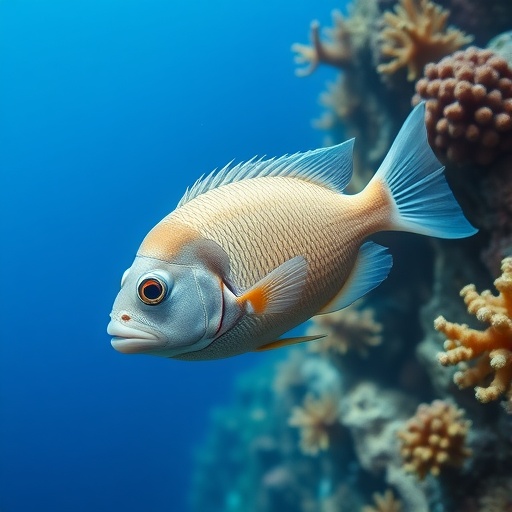In the realm of marine ecology, the intricate relationships between species often define the stability and health of marine ecosystems. A pivotal study recently published in the journal Coral Reefs sheds new light on the responses of obligate corallivore fishes during a significant coral bleaching event. This event, a pronounced and alarming phenomenon linked to climate change, triggered widespread coral mortality, presenting researchers with a unique opportunity to assess how these specialized fish species adapt to rapidly changing environments and the impact on their feeding preferences.
The research, conducted by a team comprising Gomez, Kimura, and Nakamura, meticulously documents the feeding behaviors of six species of obligate corallivores. These fishes, which depend exclusively on coral for food, offer critical insights into the dynamics of coral reef ecosystems, especially during periods of environmental stress. As coral reefs face increasing threats from climate change, including sea temperature rise and ocean acidification, understanding the adaptive responses of these fishes becomes paramount.
Initially, the study focused on the feeding preferences of these corallivore fishes before the bleaching event. The researchers employed an array of methodologies, including direct observation and dietary analysis, to establish baseline data. This foundational knowledge is crucial, as it allows for a comparison of feeding patterns post-bleaching, enabling scientists to detect shifts or changes in behavior that may signal broader ecological impacts.
As the mass bleaching event unfolded, leading to coral tissue loss and the expulsion of symbiotic algae, the scientists observed a marked alteration in the feeding behaviors of the studied fish species. The loss of their primary food source forced these obligate corallivores to display varying degrees of dietary flexibility, adapting their feeding strategies to target less preferred coral species. This adaptability highlights an inherent resilience but also raises concerns regarding the long-term viability of these species given the frequency and severity of future bleaching events.
The findings suggest that each of the six species exhibited distinct feeding preferences and responses, with some species demonstrating a greater capacity to shift their diet than others. This differentiation could have significant implications for the future of coral reef ecosystems. For instance, if certain species are better adapted to shifting food resources, they may thrive in changing environments, potentially leading to shifts in community structures that could further influence reef dynamics.
Moreover, the researchers highlighted that while some fish may initially adapt their feeding habits, the long-term consequences of sustained coral loss could lead to population declines. This is particularly alarming given that these obligate corallivores play essential roles in maintaining the health and biodiversity of coral reefs. Their feeding activities not only help to control coral growth but also facilitate nutrient cycling within these complex ecosystems.
As the study continues, scientists are calling for ongoing research to monitor the health of obligate corallivore populations as the reefs undergo transformation. The insights garnered from this research underscore the importance of preserving coral habitats and addressing the root causes of climate change. Conservation efforts must be informed by ecological studies such as this to develop effective strategies that safeguard both corals and the fish species dependent on them.
The implications of this research extend beyond the confines of academic inquiry. The fate of coral reefs affects millions of people globally, including communities relying on these ecosystems for livelihoods through fishing and tourism. As such, the findings serve as a clarion call to policymakers regarding the urgent need for action to mitigate climate change and preserve marine biodiversity. By adopting sustainable practices and reducing greenhouse gas emissions, we hold the key to a future where coral reefs can thrive, along with the myriad species that depend on them.
Furthermore, the understanding of obligate corallivore responses to environmental stressors opens avenues for more targeted conservation initiatives. For instance, creating marine protected areas that consider the resilience of various fish species to disturbances could enhance the adaptability of these fish populations. Such measures will be necessary as we grapple with more frequent and severe coral bleaching events exacerbated by global warming.
Ultimately, the study by Gomez, Kimura, and Nakamura not only enriches our understanding of fish ecology in relation to coral health but also reinforces the intricate balance within marine ecosystems. As we face an uncertain environmental future, it is vital that we amplify our research efforts and bolster our conservation strategies based on scientific evidence. The future of coral reefs, and indeed the oceans, hangs in the balance, reliant on a concerted global response rooted in sound science and dedicated stewardship.
In conclusion, the recent findings regarding the differential feeding preferences and population responses of obligate corallivore fishes during a mass coral bleaching event present both an alarming picture of ecological vulnerability and a testament to the adaptability of marine species. As researchers like Gomez, Kimura, and Nakamura peel back the layers of these complex interactions, it becomes increasingly clear that immediate and concerted action is essential if we are to protect these vital ecosystems from the irreversible consequences of climate change.
Subject of Research: Obligate corallivore fishes and their feeding preferences during coral bleaching events.
Article Title: Differential feeding preferences and population responses of six obligate corallivore fishes during a mass coral bleaching event.
Article References:
Gomez, R., Kimura, L.Y. & Nakamura, T. Differential feeding preferences and population responses of six obligate corallivore fishes during a mass coral bleaching event.
Coral Reefs (2025). https://doi.org/10.1007/s00338-025-02751-5
Image Credits: AI Generated
DOI: 10.1007/s00338-025-02751-5
Keywords: Coral reefs, obligate corallivores, feeding preferences, coral bleaching, marine ecology, climate change, conservation.




